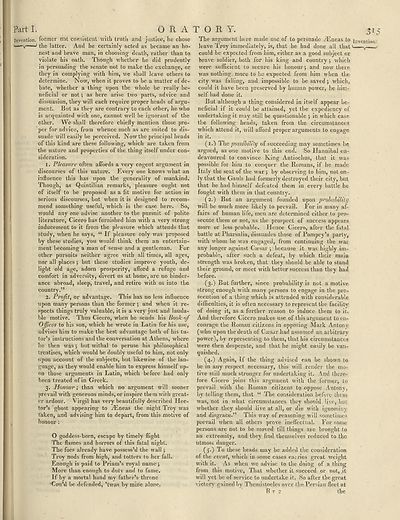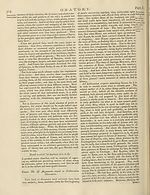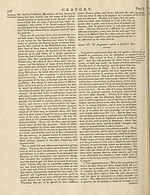Encyclopaedia Britannica > Volume 15, NIC-PAR
(365) Page 315
Download files
Complete book:
Individual page:
Thumbnail gallery: Grid view | List view

ORATOR Y.
Part I.
Invention, former iTot consistent with truth and justice, he chose
v—the latter. And he certainly acted as became an ho¬
nest and brave man, in choosing death, rather than to
violate his oath. Though whether he did prudently
in persuading the senate not to make the exchange, or
they in complying with him, we shall leave others to
determine. Now, when it proves to be a matter of de¬
bate, whether a thing upon the whole be really be¬
neficial or not; as here arise two parts, advice and
dissuasion, they will each require proper heads of argu¬
ment. But as they are contrary to each other, he who
is acquainted with one, cannot well be ignorant of the
other. We shall therefore chiefly mention those pro¬
per for advice, from whence such as are suited to dis¬
suade will easily he perceived. Now the principal heads
of this kind are these following, which are taken from
the nature and properties of the thing itself under con¬
sideration.
1. Pleasure often affords a very cogent argument in
discourses of this nature. Every one know’s what an
influence this has upon the generality of mankind.
Though, as Quintilian remarks, pleasure ought not
of itself to be proposed as a fit motive for action in
serious discourses, but when it is designed to recom¬
mend something useful, which is the case here. So,
would any one advise another to the pursuit of polite
literature, Cicero has furnished him with a very strong
inducement to it from the pleasure which attends that
study, when he says, “ If pleasure only was proposed
by these studies, you would think them an entertain¬
ment becoming a man of sense and a gentleman. For
other pursuits neither agree with all times, all ages,
nor all places *, but these studies improve youth, de¬
light old age, adorn prosperity, afford a refuge and
comfort in adversity, divert us at home, are no hinder-
ance abroad, sleep, travel, and retire with us into the
country.”
2. Profit, or advantage. This has no less influence
upon many persons than the former; and when it re¬
spects things truly valuable, it is a very just and lauda¬
ble motive. Thus Cicero, when he sends his Pook of
Offices to his son, which he wrote in Latin for his use,
advises him to make the best advantage both of his tu¬
tor’s instructions and the conveivsation at Athens, where
he then was; but withal to peruse his philosophical
treatises, which would be doubly useful to him, not only
upon account of the subjects, but likewise of the lan¬
guage, as they would enable him to express himself up¬
on those arguments in Latin, which before had only
been treated of in Greek.
3. Honour; than which no argument will sooner
prevail with generous minds, or inspire them with great¬
er ardour. Virgil has very beautifully described Hec¬
tor’s ghost appearing to Hineas the night Troy was
taken, and advising him to depart, from this motive of
honour :
O goddess-born, escape by timely flight
The flames and horrors of this fatal night.
The foes already have possess’d the wall j
Troy nods from high, and totters to her fall.
Enough is paid to Priam’s royal name;
More than enough to duty and to fame.
If by a mortal hand mv father’s throne
Con’d be defended, ’twas by mine alone.
The argument here made use of to persuade ./Eneas to invention
leave Troy immediately, is, that he had done all that u—
could be expected from him, either as a good subject or
brave soldier, both for his king and country; which
were sufficient to secure his honour j and now there
was nothing more to he expected from him when the
city was falling, and impossible to be saved 5 which,
could it have been preserved by human power, he him¬
self had done it.
But although a thing considered in itself appear be¬
neficial it it could be attained, yet the expediency of
undertaking it may still be questionable 5 in which case
the following heads, taken from the circumstances
which attend it, will afford proper arguments to engage
in it.
(if) The possibility of succeeding may sometimes be
argued, as one motive to this end. So Hannibal en¬
deavoured to convince King Antiochus, that it was
possible for him to conquer the Romans, if he made
Italy the seat of the war ; by observing to him, not on¬
ly that the Gauls had formerly destroyed their city, but
that he had himself defeated them in every battle he
fought with them in that country.
(2.) But an argument founded upon prohabiliti)
will be much more likely to prevail. For in many af¬
fairs of human life, men are determined either to pro¬
secute them or not, as the prospect of success appears
more or less probable. Hence Cicero, after the fatal
battle at Pharsalia, dissuades those of Pompey’s partv,
with whom he was engaged, from continuing the war
any longer against Caesar •, because it was highly im¬
probable, after such a defeat, by which their main
strength was broken, that they should be able to stand
their ground, or meet with better success than they had
before.
(3.) But further, since probability is not a motive
strong enough with many persons to engage in the pro¬
secution of a thing which is attended with considerable
difficulties, it is often necessary to represent the facility
of doing it, as a further reason to induce them to it.
And therefore Cicero makes use of this argument to en¬
courage the Roman citizens in opposing Mark Antony
(who upon the death of Caesar had assumed an arbitrary
power), by representing to them, that his circumstances
were then desperate, and that he might easily be van¬
quished.
(4.) Again, If the thing advised can be shown to
be in any respect necessary, this will render the mo¬
tive still much stronger for undertaking it. And there¬
fore Cicero joins this argument with the former, to
prevail with the Roman citizens to oppose Antony,
by telling them, that “ The consideration before them
was, not in what circumstances they should live, but
whether they should live at all, or die with ignominy
and disgrace.” This way of reasoning will sometimes
prevail when all others prove ineffectual. For some
persons are not to be moved till things are brought to
an extremity, and they find themselves reduced to the
utmost danger.
(5.) To these heads may be added the consideration
of the event, which in some cases carries great weight
wdth it. As when we advise to the doing of a thing
from this motive. That whether it succeed or not, it
will yet be of service to undertake it. So after the great
victory gained by Themistocles over the Persian fleet at
R r 2 the
o,
Part I.
Invention, former iTot consistent with truth and justice, he chose
v—the latter. And he certainly acted as became an ho¬
nest and brave man, in choosing death, rather than to
violate his oath. Though whether he did prudently
in persuading the senate not to make the exchange, or
they in complying with him, we shall leave others to
determine. Now, when it proves to be a matter of de¬
bate, whether a thing upon the whole be really be¬
neficial or not; as here arise two parts, advice and
dissuasion, they will each require proper heads of argu¬
ment. But as they are contrary to each other, he who
is acquainted with one, cannot well be ignorant of the
other. We shall therefore chiefly mention those pro¬
per for advice, from whence such as are suited to dis¬
suade will easily he perceived. Now the principal heads
of this kind are these following, which are taken from
the nature and properties of the thing itself under con¬
sideration.
1. Pleasure often affords a very cogent argument in
discourses of this nature. Every one know’s what an
influence this has upon the generality of mankind.
Though, as Quintilian remarks, pleasure ought not
of itself to be proposed as a fit motive for action in
serious discourses, but when it is designed to recom¬
mend something useful, which is the case here. So,
would any one advise another to the pursuit of polite
literature, Cicero has furnished him with a very strong
inducement to it from the pleasure which attends that
study, when he says, “ If pleasure only was proposed
by these studies, you would think them an entertain¬
ment becoming a man of sense and a gentleman. For
other pursuits neither agree with all times, all ages,
nor all places *, but these studies improve youth, de¬
light old age, adorn prosperity, afford a refuge and
comfort in adversity, divert us at home, are no hinder-
ance abroad, sleep, travel, and retire with us into the
country.”
2. Profit, or advantage. This has no less influence
upon many persons than the former; and when it re¬
spects things truly valuable, it is a very just and lauda¬
ble motive. Thus Cicero, when he sends his Pook of
Offices to his son, which he wrote in Latin for his use,
advises him to make the best advantage both of his tu¬
tor’s instructions and the conveivsation at Athens, where
he then was; but withal to peruse his philosophical
treatises, which would be doubly useful to him, not only
upon account of the subjects, but likewise of the lan¬
guage, as they would enable him to express himself up¬
on those arguments in Latin, which before had only
been treated of in Greek.
3. Honour; than which no argument will sooner
prevail with generous minds, or inspire them with great¬
er ardour. Virgil has very beautifully described Hec¬
tor’s ghost appearing to Hineas the night Troy was
taken, and advising him to depart, from this motive of
honour :
O goddess-born, escape by timely flight
The flames and horrors of this fatal night.
The foes already have possess’d the wall j
Troy nods from high, and totters to her fall.
Enough is paid to Priam’s royal name;
More than enough to duty and to fame.
If by a mortal hand mv father’s throne
Con’d be defended, ’twas by mine alone.
The argument here made use of to persuade ./Eneas to invention
leave Troy immediately, is, that he had done all that u—
could be expected from him, either as a good subject or
brave soldier, both for his king and country; which
were sufficient to secure his honour j and now there
was nothing more to he expected from him when the
city was falling, and impossible to be saved 5 which,
could it have been preserved by human power, he him¬
self had done it.
But although a thing considered in itself appear be¬
neficial it it could be attained, yet the expediency of
undertaking it may still be questionable 5 in which case
the following heads, taken from the circumstances
which attend it, will afford proper arguments to engage
in it.
(if) The possibility of succeeding may sometimes be
argued, as one motive to this end. So Hannibal en¬
deavoured to convince King Antiochus, that it was
possible for him to conquer the Romans, if he made
Italy the seat of the war ; by observing to him, not on¬
ly that the Gauls had formerly destroyed their city, but
that he had himself defeated them in every battle he
fought with them in that country.
(2.) But an argument founded upon prohabiliti)
will be much more likely to prevail. For in many af¬
fairs of human life, men are determined either to pro¬
secute them or not, as the prospect of success appears
more or less probable. Hence Cicero, after the fatal
battle at Pharsalia, dissuades those of Pompey’s partv,
with whom he was engaged, from continuing the war
any longer against Caesar •, because it was highly im¬
probable, after such a defeat, by which their main
strength was broken, that they should be able to stand
their ground, or meet with better success than they had
before.
(3.) But further, since probability is not a motive
strong enough with many persons to engage in the pro¬
secution of a thing which is attended with considerable
difficulties, it is often necessary to represent the facility
of doing it, as a further reason to induce them to it.
And therefore Cicero makes use of this argument to en¬
courage the Roman citizens in opposing Mark Antony
(who upon the death of Caesar had assumed an arbitrary
power), by representing to them, that his circumstances
were then desperate, and that he might easily be van¬
quished.
(4.) Again, If the thing advised can be shown to
be in any respect necessary, this will render the mo¬
tive still much stronger for undertaking it. And there¬
fore Cicero joins this argument with the former, to
prevail with the Roman citizens to oppose Antony,
by telling them, that “ The consideration before them
was, not in what circumstances they should live, but
whether they should live at all, or die with ignominy
and disgrace.” This way of reasoning will sometimes
prevail when all others prove ineffectual. For some
persons are not to be moved till things are brought to
an extremity, and they find themselves reduced to the
utmost danger.
(5.) To these heads may be added the consideration
of the event, which in some cases carries great weight
wdth it. As when we advise to the doing of a thing
from this motive. That whether it succeed or not, it
will yet be of service to undertake it. So after the great
victory gained by Themistocles over the Persian fleet at
R r 2 the
o,
Set display mode to:
![]() Universal Viewer |
Universal Viewer | ![]() Mirador |
Large image | Transcription
Mirador |
Large image | Transcription
Images and transcriptions on this page, including medium image downloads, may be used under the Creative Commons Attribution 4.0 International Licence unless otherwise stated. ![]()
| Encyclopaedia Britannica > Encyclopaedia Britannica > Volume 15, NIC-PAR > (365) Page 315 |
|---|
| Permanent URL | https://digital.nls.uk/192586443 |
|---|
| Attribution and copyright: |
|
|---|
| Shelfmark | EB.11 |
|---|---|
| Description | Ten editions of 'Encyclopaedia Britannica', issued from 1768-1903, in 231 volumes. Originally issued in 100 weekly parts (3 volumes) between 1768 and 1771 by publishers: Colin Macfarquhar and Andrew Bell (Edinburgh); editor: William Smellie: engraver: Andrew Bell. Expanded editions in the 19th century featured more volumes and contributions from leading experts in their fields. Managed and published in Edinburgh up to the 9th edition (25 volumes, from 1875-1889); the 10th edition (1902-1903) re-issued the 9th edition, with 11 supplementary volumes. |
|---|---|
| Additional NLS resources: |
|

